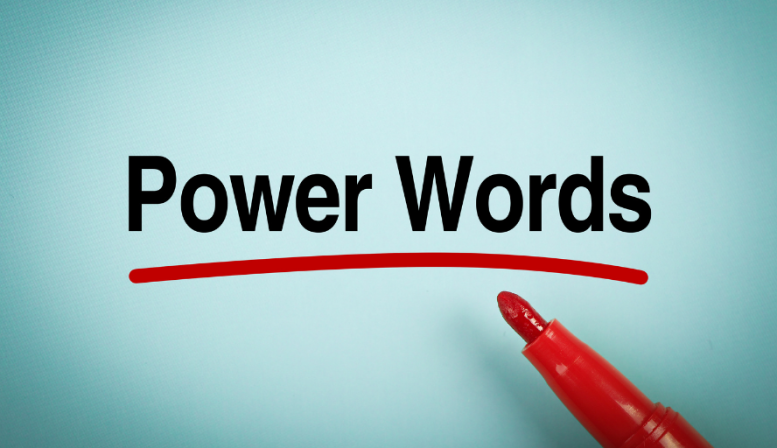Use Power Words in Your Speech to Persuade Your Audience

"Words are the most powerful force available to humanity. They have energy and power with the ability to help, to heal, to hinder, to hurt, to harm, to humiliate, and to humble."
Why do you think this quote from Yehuda Berg, an international speaker and author, is so famous and used in so many articles about compelling writing and public speaking?
Firstly, because it’s true.
And secondly, because it sounds persuasive and argumentative, thanks to the power words the speaker uses. (Did you notice that every verb of the second sentence starts with "h"?)
Power words are words that evoke emotions and responses. Implementing them in your speech wherever appropriate can boost the audience's interest, transforming even lifeless arguments into persuasive messages that compel listeners to take action.
In this post, we'll reveal the nature of power words, their types, and ways to include them in your speech to motivate and persuade your audience.
What are power words?
As the author of Well Said!, a book about public speaking, Darlene Price rightly notes, "Whether it's inspiring a nation, launching a product, building a team, or mending a relationship, the right words spoken at the right time can change history."
Indeed, let's take the iconic speeches of Winston Churchill and Martin Luther King as examples. Both are full of carefully chosen power words drawing people from one emotion to another, inspiring them to act.
Churchill's speech abstract, with power words in red:

King's speech abstract, with power words in red:

Given the above, a good definition of power words is:
Power words are persuasive and descriptive lexical items that trigger a positive or negative emotional response. Spicing content with these words, an author influences the audience's reactions and compels them to take action.
How to know if a word is powerful?
It will fit into at least one of these five qualities:
-
Unique
-
Descriptive
-
Seditious
-
Action-driven
-
Surprising
Using power words in spoken, written, or video content is your chance to engage people and have them pay attention to your message, even in today's world of content shock and super-short attention spans.
It's critical to understand what words are responsible for the particular emotion you want to elicit with your speech. Also, it's essential to know how to layout your power words for them to do good, not harm.
Keep on reading for more details.

Power words are about action and emotion: They make the audience feel something and act accordingly. But emotions are varied.
To have your target audience feel specific emotions that motivate and persuade them to do what you plan, it's critical to choose words that trigger a particular response. Clearly, your speech will fail if you aim to build authority and trust but use vocabulary that engenders anger and greed.
It doesn't mean you shouldn't appeal to negative emotions. It means that you should avoid mixing mutually exclusive or conflicting power words in your speech.
Decide on what you want to evoke, and choose the best words for your public speech to achieve that. Here are some examples of what to evoke and words to use to do so:
Inspire curiosity
Curiosity is what motivates us to research, read, listen, and learn new things. It is probably a reason why you are reading this blog post right now. With the help of corresponding power words in your speech, you can hook your audience with what you're going to reveal.
Here are some examples of curiosity power words:
-
secret
-
discover
-
join
-
private
-
hidden
-
exclusive
-
unveil
-
uncover
-
confidential
-
learn
But make sure you do satisfy the evoked curiosity with your speech. Otherwise, you'll betray the audience's trust and your authority as a speaker.
Address their fears
Fear is the most powerful emotion to grab and keep people’s attention, and that's why news channels, newspapers, and marketers often appeal to it. We bet you've heard of FOMO, aka fear of missing out on something important: That's precisely how some copywriters and essay writers use fear to motivate consumers to act.
Fear power words examples:
-
danger
-
miss out
-
mistake
-
threat
-
disappointment
-
painful
-
bloody
-
agony
-
crisis
-
shame
-
worry
-
vulnerable
Obviously, you don't want your audience to fear for their lives or experience super negative emotions when listening to you. However, there are different levels of fear; evoking a little anxiety with power words, but then saying you also have a solution, can really grab the attention of your audience and influence their perceptions of your speech for the better.
Suggest safety
When using safety power words in your speech, you make the audience feel more secure dealing with you. They need to trust what you say and have confidence that you'll keep a promise. Make them feel as if you protect them from harm by providing actionable information.
Try these power words when appealing to safety:
-
privacy
-
anonymous
-
bestselling
-
professional
-
proven
-
recognized
-
authority
-
genuine
-
survive
-
trustworthy
-
lifetime
Evoke greed
As well as fear, greed is a relatively negative emotion. We all are a little greedy, and that's why marketing copy is full of words appealing to this emotion: even when overused or cliche, they still work.
With targeted messages (what you want to tell or sell with your speech), consider using words that can help convince and convert your audience. Help them get what they want by suggesting exceptional value to them.
Appeal to greed with the following power words:
-
jackpot
-
money
-
inexpensive
-
affordable
-
extra
-
fortune
-
discount
-
attractive
-
optimal
-
deadline
-
boost
-
wealth
-
bonus
Establish your authority
As a speaker, you want to gain the audience's respect and trust. It's critical to exude authority when sharing presentation materials, and you can do that with words too.
A strong way to do this is to present third-party materials (statistics, research or study results, testimonials, and others) supporting your words. Prove that your data is relevant and critical enough for the audience to pay attention and listen to you.
Here are some power words to try to accomplish this:
-
confirmed
-
ideal
-
data
-
proven
-
agree
-
guarantee
-
accurate
-
true
-
legit
-
unquestionable
-
actual
-
flawless
Build trust
Trust goes hand in hand with authority in public speaking. It is more about building long-term relationships with the audience and convincing them that they can rely on you. Trust-related power words need to be consistent across your speech.
Here are some to try:
-
effective
-
superior
-
truly
-
best
-
results
-
complete
-
advantage
-
delightful
-
super
-
ultimate
-
worthwhile
Feed lust
Lust is not just about romantic love. It can be about craving or longing for anything, whether an emotion or material possessions. Choose the correct power words in your speech to appeal to what your consumers long for, and satisfy those desires.
Some power words to try here are:
-
passionate
-
begging
-
captivating
-
crave
-
embrace
-
tempting
-
juicy
-
charismatic
-
lovely
-
fascinating
Use them together or by themselves to hook the audience and improve your speechwriting while you’re at it.
Make them feel powerful
This is your other weapon to gain the trust of your audience. Why do you think all those corny motivational speakers and internet marketing fraudsters are so popular with thousands of people? They make their audience members feel powerful. We’re not suggesting that you take advantage of, or are dishonest with your audience, but used in moderation, making them feel powerful will help get them on your side.
These are words you can use to boost your audience’s self-esteem:
-
able
-
forceful
-
supreme
-
influence
-
prestige
-
control
-
potent
-
clever
-
prevail
-
accomplished
-
potential
-
conquer
Encourage the audience
Let's face it, most people aren't that excited and motivated to listen to a speech on coaching platforms, conferences, or other events. There’s a good chance that they sat in front of you or their screens tired, bored, or even a bit depressed. Your challenge as a speaker is to wake them up and involve them in your communication.
The power words of encouragement can help. Here go some to consider in speech:
-
amazing
-
legend
-
belief
-
excellent
-
strong
-
fantastic
-
graceful
-
victory
-
adorable
-
classy
-
uplifting
Additional tips for motivating and persuading the audience
Power words are numerous. Their biggest ambassador is Jon Morrow from Smart Blogger, continuously sharing and updating the list of power words on his blog. You can also find power word lists from copywriters, marketers, and bloggers. You can use these words in both headlines and copy, as well as your speeches. It’s a good idea to refer to such lists when looking for unique and action-driven words for your speech.
Together with power words, also consider these extra tips when trying to inspire and persuade your audience:
-
Use "you" more often than "I."
-
Call the audience and members by name when you can.
-
Practice using positive words and phrases: avoid "not" wherever possible.
-
Try using some literary devices to make your speech more compelling: Look into polysyndeton (extra conjunctions), chiasmus (reversal of structure), anaphora (word repetition at the beginning), or epistrophe (repetition at the end). Experiment with them and let us know the results.
In a word
Power words have nothing to do with psychological hacks or tricks to manipulate your audience. The use of power words is an instrument to engage people, grab their attention, and make them listen to your speech. Mix and match them whenever relevant to communicate your message and motivate your audience to take action.
Remember that certain words evoke specific emotions. Decide on what you want your audience to feel and choose your words carefully. Emotions overlap sometimes, so do your best to craft your public speech accordingly.
About the author:
Lesley Vos is a professional copywriter and guest contributor, currently blogging at Bid4Papers, a platform that helps students and authors with writing solutions. Specializing in data research, web text writing, and content promotion, she is in love with words, non-fiction literature, and jazz.







